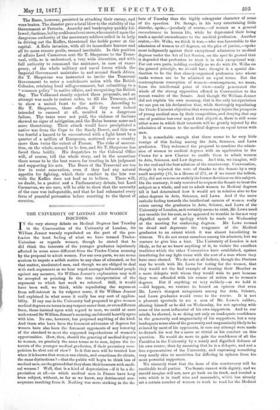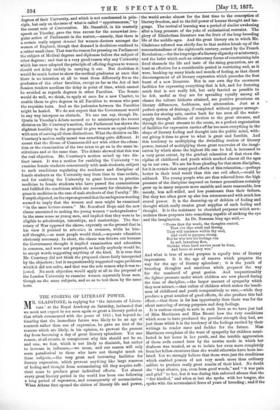THE UNIVERSITY OF LONDON AND WOMEN DOCTORS.
IN the very stormy debate on Medical Degrees last Tuesday in the Convocation of the University of London, Sir William Jenner warmly repudiated on the part of the pro- fession the least feeling of what we have termed Trades- Unionism as regards women, though he stated that he did think the interests of the younger graduates injuriously affected in some sense different from the Trades-Union meaning by the proposal to admit women. For our own parts, we are never anxious to impute a selfish motive to any class of educated, or for that matter, uneducated men, and though we are obliged to deal with such arguments as we hear urged amongst influential people against any measure, Sir William Jenner's explanation may well be accepted as pointing to the true interpretation of the argument to which last week we referred. Still, it would have been well, we think, while repudiating the argument from self-interest in its vulgarer sense, if Sir William Jenner had explained in what sense it really has any sort of applica- bility. If any one in the University had proposed to give women medical degrees on terms in any respect easier than, or even different from, those insisted upon with regard to men, we could at once understand Sir William Jenner's meaning, and should heartily agree with him. No one, however, has proposed anything of the kind. And those who have been the foremost advocates of degrees for women have also been the foremost opponents of any lowering of the standard to meet the supposed imperfections of women's opportunities. How, then, should the granting of medical degrees to women, on precisely the same terms as to men, injure the in- terests of the younger medical graduates, if their pecuniary com- petition be shut out of view ? Is it that men will be trusted leas when it is known that women can obtain, and sometimes do obtain, the same distinctions ?—that the public will begin to think less of medical men, on the ground that they share their honours with medi- cal women ? Well, that is a kind of depreciation—if it be a de- preciation at all—to which medical men in France have long been subject, without, as far as we know, any detrimental con- sequence resulting from it. Nothing was more striking in the de- bate of Tuesday than the highly misogynist character of some of the speeches. Dr. Savage, in his very entertaining little diatribe, spoke, jocularly of course,—of women as a general encumbrance to human life, while he deprecated their being made a special encumbrance to the medical profession. Another orator,—Dr. Wilks, we think it was,—who was favourable to the admission of women to all degrees, on the plea of justice,—spoke most indignantly against their exceptional admission to medical degrees under the Act of last Session, on the specific ground that it degraded that profession to treat it in this exceptional way. For out own parts, holding cordially as we do with Dr. ‘Vilks on. the general principle, we should have thought it a special dis- tinction to be the first closely-organised profession into whose ranks women are to be admitted on equal terms. But the contemptuous conception of women—contemptuous, we mean, from the intellectual point of view—really penetrated the whole of the strong opposition offered in Convocation to the recent resolve of the Senate. Aud though Sir William Jenuer did not explain his own meaning, that is the only interpretation we can put on his declaration that, while thoroughly repudiating
the Trade-Unionist objection that women may injure the prospects. of young medical men by their competition, and denying that any
one of position has ever urged that objection,there is still some other sense in which their interests will be greatly injured by the- admission of women to the medical degrees on equal terms with men.
It is remarkable enough that there seems to be very little vestige of this feeling among the Arts, Sciences, and Laws graduates. They welcomed the proposal to combine the admis- sion of women to medical degrees with an application to the Crown for a new Charter to enable them to admit women. to Arts, Sciences, and L%w degrees. And this, we imagine, will' be the real and the best solution of the controversy. Convocation, though it rejected the vote of thanks to the Senate by a very small majority (13, in a House of 271, or if we count the tellers, 275), did not reverse or stultify its former decisions on this subject. On the contrary, it only ventured to request the Senate to treat the subject as a whole, and not to admit women to Medical degrees till it had determined how it would act in relation also to the other degrees in Arts, Sciences, and Laws. And if the more catholic feeling towards the intellectual careers of women really exists among the graduates in Arts, Science, and Laws of the University of London, as it certainly seems to exist, Mr. Lowe need. not tremble for his seat, as he appeared to tremble in the not very-- dignified speech of apology which he made on Wednesday
at the meeting for conferring degrees. Mr. Lowe seemed to dread and deprecate the vengeance of the Medical graduates to an extent which it was almost humiliating to witness. We do not count ourselves among his admirers, but we- venture to give him a hint. The University of Loudon is not likely, as far as we know anything of it, to violate the excellent tradition which the other Universities have established, against interfering for any light cause with the seat of a man whom they have once elected. We do not at all believe, though the Doctors may be wroth with Mr. Lowe for voting for the women, that they would set the bad example of treating their Member as a mere delegate with whom they would wish to part because they were offended with his course of action as to women's degrees. But if anything so very unlikely—as we hold it. —did happen, we venture to hazard an opinion that even Mr. Lowe's sharpest antagonists among the Arts, Science, and Laws graduates would come to the rescue. It is not a pleasant spectacle to see a man of Mr. Lowe's calibre,. abasing himself as he did on Wednesday, for not agreeing with- some of the most influential of his own supporters. And to our- minds, he showed, in so doing not only an inadequate confidence in the generosity and magnanimity of his supporters, but a very inadequate sense also of the generosity and magnanimity likely to be evinced by most of his opponents, in case any attempt were made to disturb his seat for a cause so trivial as his conduct on this- question. He would do more to gain the confidence of all the Faculties in the University by a manly and dignified defence of his own course; than by assuming that he is a delegate, and not a free representative of the University, and expressing something very nearly akin to contrition for differing in opinion from his most powerful supporters.
We sincerely trust that the issue of this controversy will be creditable to all parties. The Senate cannot with dignity, and we should imagine will not, now go back on its track, and rescind a vote which is in itself wise and reasonable, which has already set a certain number of women to work to read for the Medical'
degrees of their University, and which is not condemned in prin- ciple, but only on the issue of what is called " opportuneness," by the recent vote of Convocation. Mr. Stansfeld, in his masterly speech on Tuesday, gave the true excuse for the somewhat irre- gular action of Parliament in the matter,—namely, that there is a certain really urgent demand for women-doctors amongst the women of England, though that demand is doubtless confined to a rather small class. That was the reason for pressing on Parliament the subject of Medical degrees and diplomas before the subject of other degrees ; and that is a very good reason why any University which has once adopted the principle of offering degrees to women should not delay unduly in carrying it out. But doubtless it would be much better to show the medical graduates at once that there is no intention at all to treat them differently from m the graduates of the other faculties, except so far as the Act of last Session renders needless the delay in point of time, which cannot be avoided as regards degrees in other Faculties. The Senate would do well, we think, to apply at once for a new Charter, to enable them to give degrees in all Faculties to women who pass the requisite testa. And so the jealousies between the Faculties might be healed. We do not expect that the Government would in any way interpose an obstacle. No one can say, though Dr. Quain in Tuesday's debate seemed so to misinterpret the recent division on Mr. Courtney's motion, that Parliament has shown the slightest hostility to the proposal to give women an equal chance with men of earning all these distinctions. What the division on Mr. Courtney's motion really meant was something quite different. It meant that the House of Commons did not wish either the educa- tion or the examination of the two sexes to go on in the same in- stitutions and at the same time. The debate showed that this was the real objection. Mr. Courtney's motion mixed up two dis- tinct issues. It was a motion for enabling the University " to examine female students concurrently with male students, subject to such conditions regulating the residence and discipline of female students as the University may from time to time ordain, and for enabling the University to grant licences to practise medicine to female students who have passed the examinations and fulfilled the conditions which are necessary for obtaining de- grees in medicine in the case of male students of that Faculty." Mr. Forsyth objected, on the express ground that the ambiguous wording seemed to imply that the women and men might be examined " in the same lecture-rooms." Mr. Beresford Hope said the new clause amounted to making the young women " undergraduates " in the same sense as young men, and implied that they were to be eligible to scholarships, tutorships, and masterships. The Sec- retary of War opposed the clause, expressly on the ground that in his view it pointed to education in common, while he him- self thought,—as most people would think,—separate education obviously necessary. In short, the clause was thrown out because the Government thought it implied examination and education in common, and were not prepared, as hardly anybody would be, to accept words suggesting anything of the kind. It is true that Mr. Courtney did not think the proposed clause fairly interpreted by the objectors ; but it unquestionably suggested vague problems which it did not solve, and that was the sole reason why it was re- jected. No such objection would apply at all to the proposal of the London University to examine women separately from men, though on the same subjects, and so as to test them by the same tests.



































 Previous page
Previous page